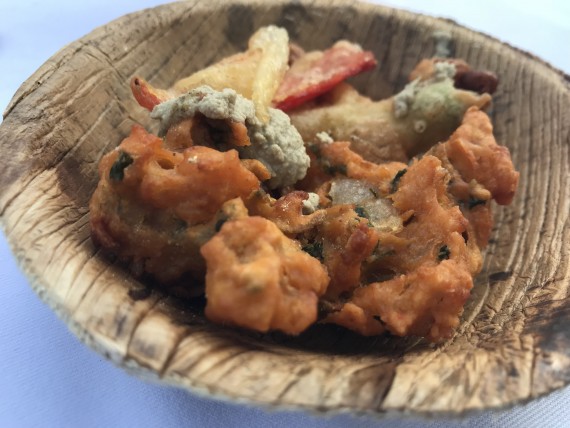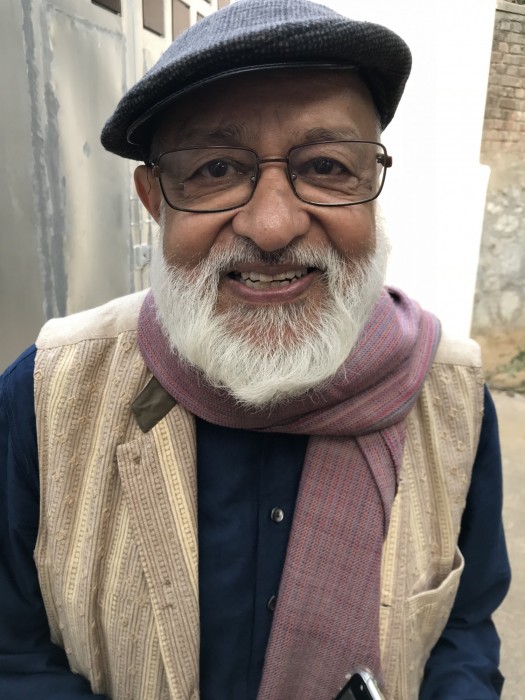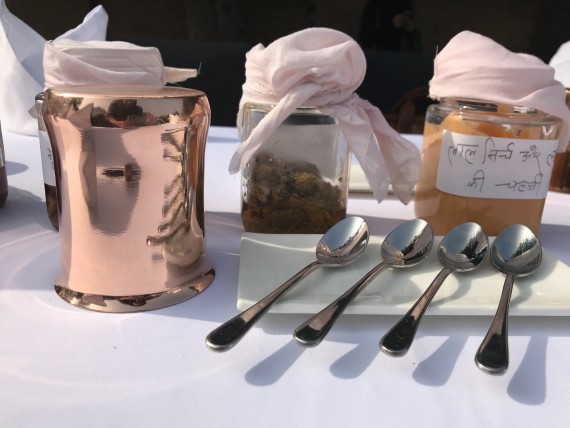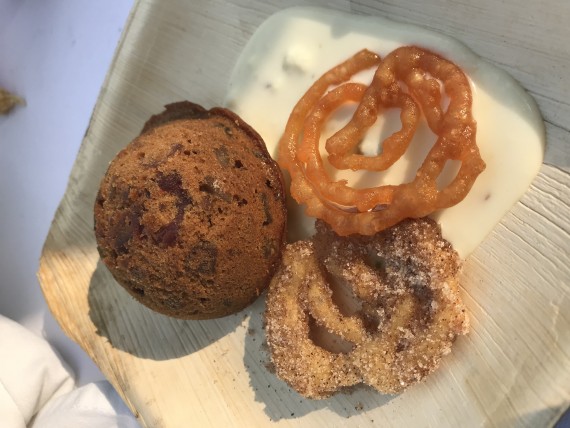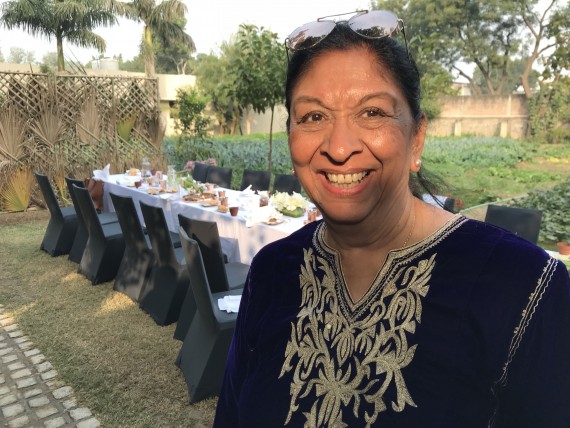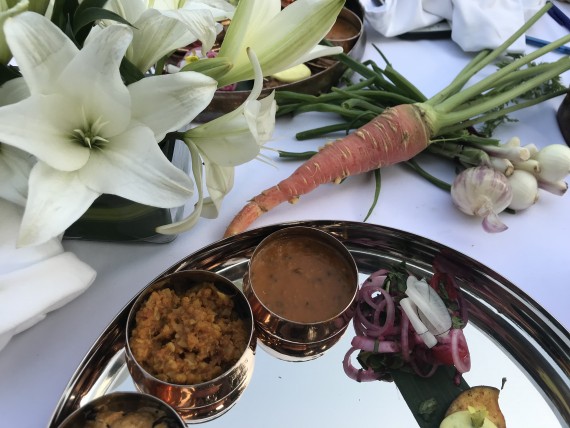
Tasting India
THE INAUGURATION LUNCH of the Tasting India Symposium in Delhi was at Roseate Farm; a venture into small-scale organic farming and the ‘heart project’ of Mrs. Radha Bhatia, Chairperson of the Bird Group that owns the family of Roseate hotels.
The farm supplies the Roseate hotels in Delhi with organic produce. Tasting India is a platform and symposium founded by the Cultural Curator, Sanjoo Malhotra and Food Writer, Sourish Bhattacharyya.
Sanjoo and Sourish are on a roll, to say the least. Tasting India has the highest ambitions to create a sustainable food culture in India. It is actively connecting all types of stakeholders working within organic food production; from small-scale farming that builds local community resilience, to food distribution such as independent food brands, farmers markets, coops for local crafts and traditions, to experience promoting regional and cultural diversity, such as education, chefs working with seasonality, eco-tourism and environmental sustainability, and last but not least- NGOs working with human ecology, from gender and identity to food sharing.
The symposium’s launch meal was a tasting menu and journey into Ayurvedic thought, designed by Chef Nishant Choubey, as representative of the produce from the idyllic farm settings.
Renowned food expert Professor Pushpesh Pant explained: “The concept of the meal is from ‘farm to plate’ – in times gone by everyone in India ate like that. Whatever was grown in the kitchen garden came directly to the dinner table. But right now, it’s only the super-rich who seem to be able to eat completely organically grown, pesticide-free, fresh food, grown from a nearby farm, with all the nutrients that rich, clean soil gives.”
Everyone can still eat like this if they keep two things in mind, the professor says.
“Eat seasonally, and eat regionally. Eat what you get locally in that season, buy your produce and then explore your creativity to see what you can do with what is in season.”
The word Ayurveda is Sanskrit, meaning ‘life-knowledge’. It’s a complete system of how to maintain health and balance in life, the philosophy of health at the heart of Jainism, Buddhism and Hinduism, and permeates every aspect of life, not least of all, food.
Food is at the centre of life. It is pleasure and it is nutrition. It is culture and identity. In the Ayurveda tradition, food functions to build a healthy metabolism, by moderating foods that can be harmful to the mind or body. When you consider the Ayurveda way of food, you will see an overlap with cultures from all over the world. Food is life, food is medicine. A nutritious and balanced diet can limit diseases stemming from internal inflammation.
The Professor concludes: “You do not have to choose between a healthy life and a pleasurable life; it is part of a healthy, balanced life to enjoy food! Life is meant to be enjoyed, and taking pleasure in life is part of finding balance.”
Ayurveda; 1000-year-old Systems Thinking
The Ayurveda approach to food is known as a ‘Sattvic’ diet or ‘yogic’ diet. It is supposed to be a conscious, holistic approach, from producing to consuming, that today we call ‘from farm to table.’ But from farm to table is nothing new- this is the way everyone used to eat and the way some rural communities still support themselves.
The diet itself has an innate awareness of the connectedness to nature and interconnectivity with community upon which we all rely. It places emphasis on nurturing the essential: using seasonal and local foods from your own kitchen garden or village farm. It’s about ethics and knowledge of where the food comes from and where the waste goes.
A Sattvic diet is, therefore, vegetarian, as there is no need to slaughter animals to maintain our health. Cows are an intrinsic part of the organic farm though; the bullocks are used for ploughing, the cows give milk, and both produce natural fertilizer from vegetable scraps. It’s the small-scale organic farming system that fed the whole of India until the 1960’s. It’s a system that could work today, if we value and support the work of our farmers, and create efficient systems and infrastructures that get their produce to market.
The Six Tastes of Ayurveda
Most of us who have heard about Ayurveda have heard about the three doshas, or three elements called Vata, Pitta and Kapha. When the doshas are in balance, a person can reach optimal health, while imbalance of the doshas provokes disease. Or as the saying goes: ‘You are what you eat.’ What was new to me were the 6 Rasas, or 6 tastes of Ayurveda, that balance the three elements in our bodies. These are Sweet, Sour, Salty, Pungent, Bitter, and Astringent.
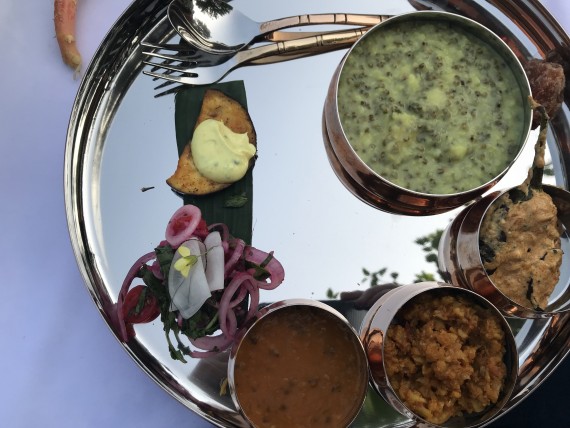
A dish with humble origins; Khichra, a beautifully delicate and ‘more-ish’ porridge of lentils, rice and quinoa.
A chef working with Indian cuisine not only needs to know about the flavours of food, that make food pleasurable, but also the medicinal values of those foods and their effect on the body in combination. It’s a fundamental difference between traditional and modern eating habits all over the world. In the past, the person who prepares food is the guardian of our health. Mothers, daughters, sisters, wives.
Chef Nishant Choubey adds: “Today, as we eat out in a variety of places, the responsibility for our health and nutrition has shifted to the individual. More and more, food is designed to be enticing but not nutritional. Food has to be both, or it is empty of meaning.”
Links:
Roseate Hotels. http://www.roseatehotels.com/
The Bird Group. http://www.thebirdgroup.com/
Tasting India. http://www.tastingindiasymposium.com/
Incredible India: http://www.incredibleindia-tourism.org/


